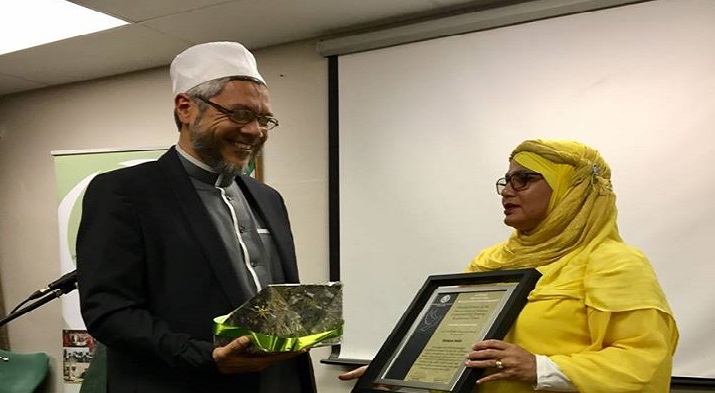This weekend, the International Peace College South Africa (IPSA) hosted its 3rd Annual Women in Islam – Women in South Africa (WIWISA) Symposium. The event was hosted at its Rylands campus on Saturday, October 29, 2016. The annual WIWISA symposium forms part of the institutions broader campaign to promote dialogue on various issues related to gender and gender-justice within the context of the South African Muslim community. The theme for the 2016 symposium is ‘Muslim Women at the Intersections of Violence’, a topic that many consider under-addressed.
This year’s WIWISA Honorary Award was conferred to Soraya Salie who established the Bonteheuwal Walking Ladies, a community organization that is directed toward developing and maintains safe spaces for women within the community.
Speaking to VOC’s Drive Time, principal of IPSA, Shaykh Ighsaan Taliep, explains that both in content and interaction, the event was received well and proved to be a success.
Taliep says that in an intersectional manner, the symposium called to the fore violence within the context of racism, poverty and terror with an intended address directed toward issues that face Muslim women.
“This is far less spoken about than the normal issues that we speak about women, such as dress code, modesty, and motherhood. We, therefore, believe that we needed to centre stage the issues of violence against women,” Taliep stated.
While he notes that communities are home to a plethora of socioeconomic issues, Taliep says that the origin of the community concerns needs to be addressed.
The symposium was host to a number of renowned female academics and communities activists, who each rendered thought provoking discussions.
Addressing the symposium Manenberg community activist, Gabeba Gaiden presented a discussion on her research, which focuses on the context of drug and gang wars from the vantage point of her lived experiences.
Given the impact of gang violence within Cape Town communities, a region that has become synonymous with violent gang flare-ups, Gaiden made use of research conducted by Dr Shahnaaz Hoosain, Intergeneration Transmission of Trauma, which focuses on the causes of violence and trauma.
Gaiden also addressed the historical threads of violence that permeates through the Cape Flats by linking the brutality of gang violence and drugs to the submissive measures entrenched in the legacy of both the colonial and Apartheid structures.
Political analyst and gender activist, Ayesha Kajee discussed the complexities of racism and gender violence within the context of Africa.
“Kagee very aptly reminded us of the vivid recollections within the context of Boko Haram and the Bring Back our Girls campaign, as well as the context of the Arab Spring in North African Muslim states and how women were taken advantage of,” Taliep added.
Rendering the final speech, director of Ihata Shelter, Nuraan Osman, reflected on the intersections of poverty, where she focussed on poverty in relation to gang activity and drug abuse.
“Osman’s own experience in the context of the Ihata shelter was definitely of a wonderful complimenting nature.”
Osman also reflected on the role of perceptions of gender within society, which she asserts is entrenched within the mind-set of individuals in early childhood and manifested in built-up frustration as women enter society.
Given the impact of gender violence and spousal abuse, Osman highlighted the fact that only one shelter catering to Muslim women exists within South Africa – the Islamic Resource Foundation of South Africa (IRFSA).
“She really struck a chord with us, since IRFSA is the only shelter for Muslim women in the whole country. Those are manifestations of the lack of attention that we give to these areas,” Taliep continued.
VOC






 WhatsApp us
WhatsApp us 

